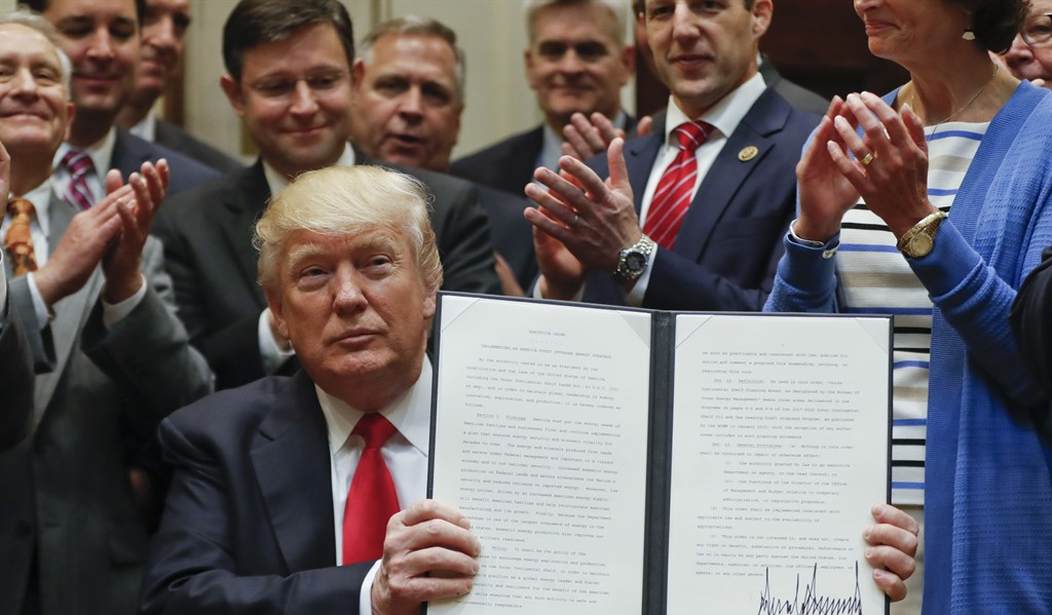A month ago, the Department of Justice raised eyebrows on the Right by continuing to pursue lawsuits defending the HHS contraception mandate, even though Donald Trump had campaigned against it. A week later, Trump signed an executive order with representatives of the Little Sisters of the Poor in attendance promising to protect religious liberty, but which had no legal impact at all on their legal fight for conscience rights. Today, however, the New York Times reports that the Trump administration has taken the first steps to eliminate the basis of the lawsuits and the infringement on religious liberty:
Federal officials, following through on a pledge by President Trump, have drafted a rule to roll back a federal requirement that many religious employers provide birth control coverage in health insurance plans. …
Mr. Trump signaled a change in direction on May 4, when he issued an executive order instructing three cabinet departments to consider amended regulations to “address conscience-based objections to the preventive-care mandate.” The order cites a section of the Affordable Care Act that refers specifically to preventive services for women.
Mr. Trump removed any doubt about his intentions when he signed the executive order that day. At a ceremony in the Rose Garden of the White House, he celebrated the faith of the Little Sisters of the Poor, a 178-year-old religious order that refused to comply with the contraceptive coverage mandate and fought it all the way to the Supreme Court.
The president invited the Little Sisters to join him on the dais, announced that they “sort of just won a lawsuit” and told them that their “long ordeal will soon be over.”
It took four months for the Trump administration to take that first step, of course, and almost a month since the executive order, but at least the process is finally underway. Courts have repeatedly ruled that the HHS contraception mandate and its ill-considered conscience exemptions infringe on legitimate expressions of religion; the Supreme Court confirmed that in Hobby Lobby, and made it clear that the Obama administration needed to provide more robust and broad exemptions. They decided to stand pat instead, which should have made this a slam-dunk for a first-days action.
That doesn’t mean relief will come immediately, or without challenge either. Because the rule has been in place for five years, Congress could not roll it back through the Congressional Review Act, which means that HHS Secretary Tom Price has to go through the rule-making process. That requires a certain amount of time for public comments and a formal process of implementation before a new rule can go into effect. When it does, the lawsuits involving the Little Sisters and other employers will get mooted, regardless of what career attorneys in the DoJ want to do with the cases.
However, the sailing may not be entirely smooth to that destination. The NYT reports that advocates of the mandate plan on suing the administration if they can’t stop the rule change through the regulatory process, using the ACA’s language as a lever. According to the National Women’s Law Center, the statute prohibits any rule that “impedes timely access to health care services” or “creates any unreasonable barriers to the ability of individuals to obtain appropriate medical care.” That, however, is likely to be rebutted by evidence available from the CDC that shows that Americans had universal access to contraception before the ACA. In a 28-year study the CDC offered a number of reasons for unplanned pregnancies in which a lack of access to contraception didn’t even register as a cause. As I wrote at the time:
Obama and his administration insist that women need better access to contraception and abortifacients, but few women have problems accessing them. The CDC reported in 2009 that contraception use wasn’t exactly lacking: “Contraceptive use in the United States is virtually universal among women of reproductive age: 99 percent of all women who had ever had intercourse had used at least one contraceptive method in their lifetime.” Of all the reasons for non-use of contraception in cases of unwanted pregnancy, lack of access doesn’t even make the CDC’s list; almost half of women assumed they couldn’t get pregnant (44 percent), didn’t mind getting pregnant (23 percent), didn’t plan to have sex (14 percent), or worried about the side effects of birth control (16 percent). In fact, the word access appears only once in this study of contraceptive use, and only in the context of health insurance, not contraception.
In other words, this rule never did have anything to do with providing previously unavailable access. It was a purely political sop to progressives who wanted more free stuff, and the Obama administration stuck employers with the bill. If the NWLC plans to attack a rule change on the basis of access and barriers, they’re going to have a very difficult time making it stick in court.







Join the conversation as a VIP Member